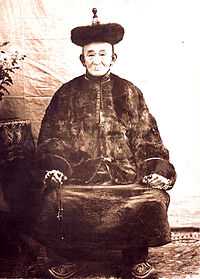Gonchigjalzangiin Badamdorj
| Gonchigjalzangiin Badamdorj | |
|---|---|
 | |
| Prime Minister of Mongolia | |
| In office 1919 – January 1920 | |
| Preceded by | Tögs-Ochiryn Namnansüren |
| Succeeded by | Dambyn Chagdarjav |
Gonchigjalzangiin Badamdorj (Mongolian: Гончигжалцангийн Бадамдорж; Chinese: 巴德瑪多爾濟; Standard Tibetan: པདྨ་རྡོ་རྗེ།) was an early 20th-century Mongolian religious figure and prime minister under the Bodg Khaanate from late 1919 to January 1920. He is most remembered in Mongolia for caving to Chinese threats and signing the "Sixty-Four Articles" wherein Mongolia "voluntarily" relinquished its claims to independence from Chinese rule in 1919.
Early career

Early in his career Badamdorj was an administrator, or shanzav of the Bogd Gegeen's estates. In 1895 he was sent to St. Petersburg by Mongolia’s then spiritual head, the Jebtsundamba Khutuktu as the first Mongolian envoy to meet with the newly enthroned Czar Nicholas II and seek Russian assistance in breaking free from Chinese rule. The Russians responded positively and suggested the Mongolians work secretly with Russia’s envoy in Niislel Hüree.
In 1910 as part of Manchu efforts to increase Chinese control over Mongolian territory the Manchu Emperor Puyi issued a decree removing Badamdorj from his position as Shanzav and installing Sanduo, a Chinese educated Mongolian, as governor and Chinese viceroy in Hüree.
Following Mongolia's declaration of independence from Chinese rule in 1911, Badamdorj was appointed as the first Minister of Religion and State in 1912 under the Bogd Khan. In 1915 he was appointed Minister of Internal Affairs after his previous office, along that of prime minister, was abolished.
Prime minister
In 1919 Chinese warlord Xu Shuzheng occupied Niislel Khüree and installed Badamdorj, who represented reactionary lamas and was considered to be more pliable to Chinese demands, as prime minister. Xu threatened to exile the Bodg Khan if Badamdorj did not sign the "Sixty-Four Articles" wherein the Mongolian government “voluntarily” relinquished the country's autonomy to Chinese administration. Other national leaders including Foreign Minister Tserendorj and the Bodg Khan himself soon followed suit. Badamdorj remained prime minister for only a short period thereafter, until January 1920.
Badamdorj was branded a coward for not standing up to the Chinese threats and he soon became the victim of a rumor campaign designed to taint his reputation. Ordinary people and even children would regularly insult him. Disgraced, Badamdorj fled to the countryside and died a short while later.
Sources
- Sanders, Alan J. K. (1996). Historical dictionary of Mongolia. Asian historical dictionaries, No. 19. Lanham, MD: Scarecrow. ISBN 978-0-8108-3077-6
- Baabar, B. (1999). From world power to Soviet satellite: History of Mongolia. Cambridge: University of Cambridge. OCLC 318985384
| Political offices | ||
|---|---|---|
| Preceded by Tögs-Ochiryn Namnansüren |
Prime Minister of Mongolia 1919-1920 |
Succeeded by Dambyn Chagdarjav |
| |||||||||||